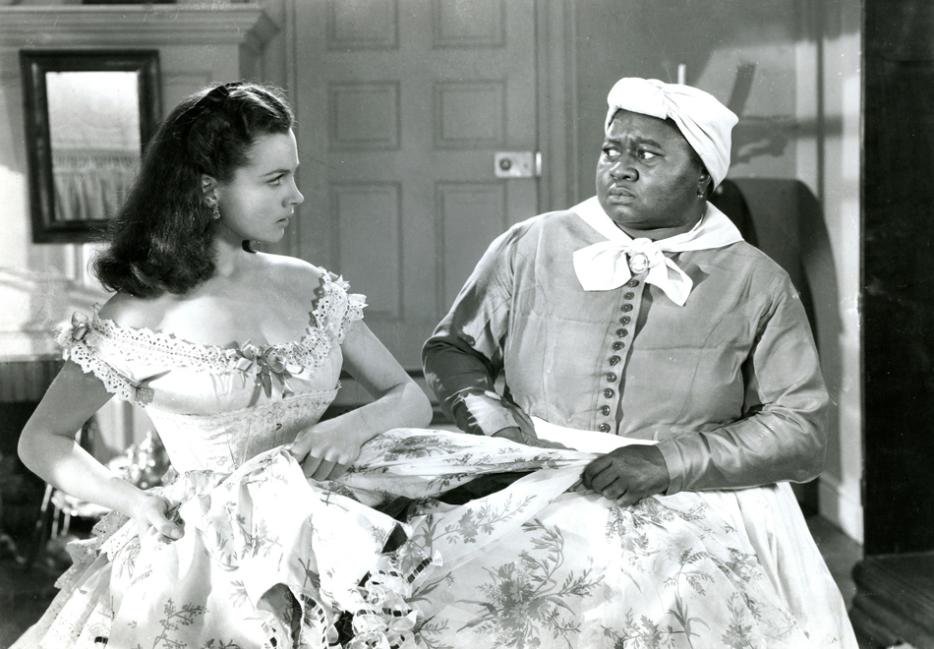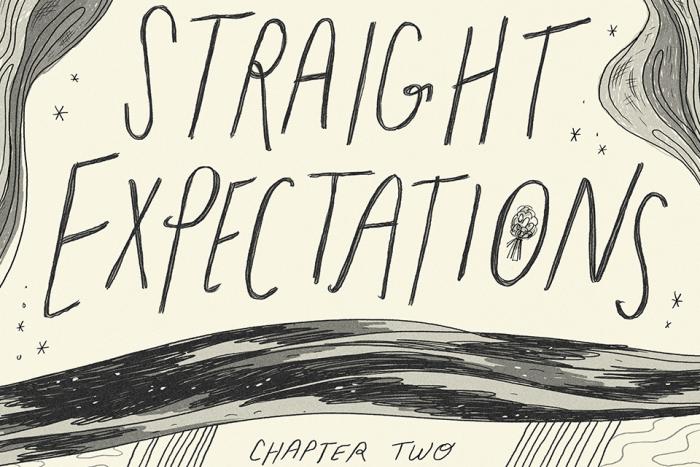In 1940, when Hattie McDaniel, the daughter of two former slaves, became the first Black person to ever win an Oscar (she won Best Supporting Actress, for her portrayal of Mammy—a slave—in Gone with the Wind), she was taught a lesson: “Good enough” to win an Academy Award doesn’t mean “good enough” to sit with the rest of your film’s white cast while waiting to receive it. McDaniel was only let into the building for the awards ceremony because of a favour called in by the film’s white producer. Still, of winning the award, she said: "I shall always hold it as a beacon for anything I may be able to do in the future. I sincerely hope that I shall always be a credit to my race and the motion picture industry." Her trailblazing not without controversy, Hattie was later disowned by the NAACP for perpetuating negative stereotypes of Black people.
Just as trauma doesn’t have discrete edges, America’s racist legacy knows no bounds, and Hollywood was no better (or safer) for Black people than the world beyond the big screens and bright lights.
Thoughts of bodily autonomy and slavery and Hattie McDaniel and lessons learned are with me when I read the online commentariat coming for director Nate Parker after the details of his 1999 rape trial resurface. These details are hard to stomach: Parker and his writing partner Jean Celestin were roommates and Penn State wrestlers when they were both tried for allegedly raping an eighteen-year-old schoolmate. According to court documents, the two men were accused of assaulting the young woman while she was unconscious. Both Parker and Celestin, nineteen at the time, claim the encounter was consensual. Parker was acquitted after a three-day trial during which the victim underwent severe scrutiny. Celestin was originally found guilty, a fact some believe was related to Penn's "contentious racial climate" at the time (the victim was white, and both Parker and Celestin are Black). That conviction was later overturned when a judge found Celestin's counsel to have been ineffective.
As polarizing as they are horrendous, the sordid, murky elements of this story only become harder to grapple with upon learning that the unnamed woman who survived the alleged assault did not survive the third suicide attempt she made in the years following the ordeal. She had been treated for depression since 1997 (before ever meeting Parker or Celestin), and, in the years following the trial, her mental state only declined. According to a detailed breakdown reported by The Daily Beast, she eventually entered a state of psychosis, and died in 2012, only thirty years old.
When the information first came to light, Parker told Variety, “Seventeen years ago, I experienced a very painful moment in my life. It resulted in it being litigated. I was cleared of it. That’s that.” After receiving wide criticism for his insensitivity, Parker seems to have gone through some consciousness raising regarding issues of male privilege, toxic masculinity, and rape culture—he recently apologized for his original responses, which he calls “selfish,” and gave Ebony a candid interview in which he openly discusses what he’s learned.
What does the Academy’s president, Cheryl Boone Isaacs (a Black woman), have to say about it all? "My belief is that people need to see the movie and judge the movie.” She is, of course, referring to Parker’s The Birth of a Nation, which tells the story of the Nat Turner slave rebellion and received a standing ovation following its premiere at Sundance in January, after which Fox Searchlight offered Parker $17.5 million for worldwide rights.
White director Roman Polanski has been nominated for twenty-six major film awards since he was convicted of raping a minor. Woody Allen, accused of molesting his then seven-year-old adopted daughter, Dylan Farrow, in 1992, a claim Farrow maintains to this day, has also been nominated for multiple awards since. But many are wondering if The Birth of a Nation, once extolled as an Oscar frontrunner, will be able to recover from its contemporary association with real-life sexual violence.
While some people are asking why the studio didn’t vet Parker (and Celestin) before making the record-breaking deal, I’m mostly thinking about how their film “got through”—which is to say, entered into and was lauded by this hegemonic, historically white institution. The Birth of a Nation allows us to better envision a world in which Black filmmakers and writers and producers and actors have a so-called seat at the table, and for that alone, the film is revolutionary. No, this recognition isn’t something we need, but I’d be lying if I said it wasn’t important.
In Ain't I A Woman, cultural critic bell hooks writes: “the struggle to end racism and the struggle to end sexism are naturally intertwined.” One night, as we struggled to make sense of Parker’s art in the context of these allegations, a girlfriend said to me, “I'm acutely aware that, as much as Parker is a man, he is also Black; in that sense, attacks against him are also attacks against me. How unsettling, then, that defenses of him are attacks against me, too.”
Are we so hungry for liberatory art—which specifically addresses social and political structures that historically, presently oppress peoples—that we’re willing to forgive artists who commit abominable acts? My friend says that when you’re starving, even crumbs can be a feast.
I fell asleep thinking about something another friend, a Black woman filmmaker, said to me: “I think that, probably, part of our emancipation is learning how to be individual. But at the same time, how we gonna get anything done if we don’t think of ourselves as a whole?”
*
In an essay for the New Yorker, Mary Karr recently wrote that “all women have been to some degree sexually assaulted,” and I agree with her estimate. Most of the time I am adept at not thinking about the violations I’ve endured simply because I am a woman. But both bodies and minds can be groped, touched without permission, used without consent. (Which is probably why my memory only works perfectly when I don’t really want to remember.)
Right now I am remembering that there is a concept called bodily autonomy that many think of as a human right. The belief is that no one but the individual can control who uses her body, for what, and for how long. But when a woman is raped, her rapist treats her body as if it does not belong to her, and this, we know, both legally and morally, to be wrong. Still, somewhere in America, a woman is raped every two minutes.
But I am not just a woman; I am a Black woman, and so I cannot think of this concept without also remembering how Black people’s bodies have often not been our own. For hundreds of years on this continent and others, white people who owned Black people had final say over how and when Black bodies were used. Black men, treated as breeding sires, were forced to rape Black women who were forced to birth babies that were not legally theirs.
Is there a contract between my Blackness and myself that I can’t betray? Does it apply to my womanness, too?
This was preceded by Black bodies being forced onto boats, where, sometimes, those that were too old or too frail or otherwise considered not precious were thrown overboard just to lighten the load and relieve white men of the burden of having to feed bodies they did not, for one reason or another, like or want. Other times, while making this long, forced journey, Black heads belonging to Black bodies deemed “unruly” were severed and impaled on spikes so that Black eyes would see and know to behave. More recently, Black bodies hanging from trees or burned upon stakes were used in exactly the same way—as examples. “Let this be a lesson,” we have been told over and over again.
These lessons, the dark stains carried over from America’s original sin, have ways of imprinting on our society, but most especially on the souls of Black folks. Just two years ago in North Carolina, a seventeen-year-old Black boy was found hanging, dead, from a swing set early one morning. He was wearing too-small shoes that were not his own; the belt he was hanging from did not belong to him either. And despite the nearly impossible mechanics, his death had been ruled a suicide, something an FBI probing (pushed for by the NAACP) confirmed. His family maintains that they know the truth. The boy was found in a nearly all-white trailer park, and it is us, Black people, who have inside knowledge of what happens to Black bodies in white spaces.
I eventually read more details of Nate Parker’s trial, which also make me remember things—to the point of feeling sick. The depravity and disrespect I come to believe Parker and Celestin exhibited is textbook. While taking in the transcripts of conversations Parker had with his alleged victim, my heart starts racing and my stomach, typically steeled against any outside attack, becomes queasy. I can feel it in my gut, in my groin, in my mouth, in my chest—I know this man. I do not like him.
I read that Nate Parker was never found guilty of this crime, but I know that doesn’t mean he didn’t violate that woman’s body. Afterwards, I read lots of reactions that say great art should not come at the expense of women’s bodies or lives. Then, almost involuntarily, I think of all the things “greatness” has come at the expense of.
*
“Yo. Nate Parker?” My friend has sent me a message, asking me to weigh in on the subject.
“I have FEELINGS,” I write back. It only takes a second to realize that they are harder to articulate than they are to simply feel, so I call my dad looking for a reprieve and to find out what he thinks. “You can be staunchly against rape and crimes against humanity while also promoting revolutionary art that has the power to inform society,” he says. “We have to figure out how to not be a tools of our own suppression when we hear about Black people who have done terrible things.”
Afterwards, I think about that concept a lot—is there a contract between my Blackness and myself that I can’t betray? Does it apply to my womanness, too? I don’t even want to introduce artist or anything else into the mix; I can barely deal with the two most blatant identities I inhabit.
Last week, a subject I was interviewing for another piece said to me: “I’m a female; I’m also Black; I’m also gay, bisexual—I have fluid sexuality; I’m also from a very poor background. Those four things really created my character and my identity. And because of all of those things, because I’ve had knives thrown at me from all directions because of one thing or another, I have very open eyes.”
Her words affected me; I took them as a challenge. You better keep your eyes peeled, she was saying, or else you’ll fall victim to a blight of selective recognition—a condition America’s had for years and years. I started writing more things down after that.
*
I keep asking myself, What kind of woman are you? (And: What does it mean to be Black? And: How will you respond, as an artist?)
The truth? The truth is that I’m not sure. The truth is that I’m happy The Birth of a Nation is getting a huge box office release, and it has nothing to do with me being happy for Nate Parker.
Unlike Al Sharpton, I don’t think the current interest in Nate Parker’s seventeen-year-old rape case is a right-wing conspiracy. But my knowledge that Black Americans have been systematically excluded from so many arenas of public life and especially the film industry becomes problematic if I’m expected to take a stance on not just the filmmaker but the film itself. Perhaps if Hollywood were more inclusive (which is to say, if historical oppression and racism weren't things), Parker's movie wouldn't represent so much. Maybe then I wouldn't be in this double bind; annihilating one part of myself to soothe or advance the other. It feels like I'm in one of those awful horror movies, forced to choose between losing a leg or losing an arm. I made up my mind, though, after hearing that Amazon Studios spent upwards of $20 million to acquire Woody Allen’s latest flick, complete with the expected all-white cast, sight unseen. (Which makes a piece of advice Ava DuVernay gave on getting ahead in an industry in which one is a minority all the more tragically ironic: "You gotta follow the white guys. Truly. They’ve got this thing wired.”)
So, what kind of woman am I? One with Black skin living in America. One who wants to believe in Nate Parker’s art. One who maintains that believing in his art doesn’t mean I don’t believe his victim.






